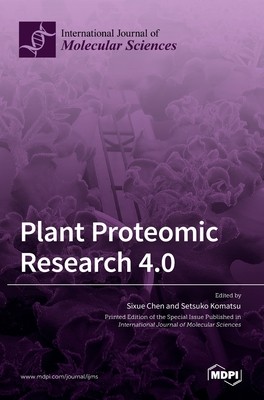
- We will send in 10–14 business days.
- Publisher: MDPI AG
- ISBN-10: 3036526625
- ISBN-13: 9783036526621
- Format: 17 x 24.4 x 2.2 cm, hardcover
- Language: English
- SAVE -10% with code: EXTRA
Plant Proteomic Research 4.0 (e-book) (used book) | bookbook.eu
Reviews
Description
As an important tool of systems biology, proteomics has enabled a deep understanding of different plant processes and functions. Complemented with genomic data, computational tools, and improved sample preparation strategies, proteomics has an unprecedented opportunity to characterize plant proteoforms in high spatial and temporal resolution. This special issue of Plant Proteomic Research 4.0 captures the recent advancements in proteomics and addresses the current challenges of plant stress response and resilience in the ever-changing climate. It contains 12 articles, including three reviews and nine original research articles. The three reviews deal with pollen phosphoproteomics, starch biosynthesis-related proteins and posttranslational modifications (PTMs) in rice developing seeds, and PTMs of waxy proteins in rice grain. The nine research articles include three related to temperature, two on water stress, two on salt stress, one on fungal pathogen, and the last one on field-grown potato apoplast proteome. The articles reflect the current frontiers of plant proteomics, focusing on themes of environmental stresses, proteoforms/PTMs, crop species, and new development in data-independent acquisition mass spectrometry. They provide readers insights into current technologies, their utility in understanding plant growth and resilience, as well as directions of proteomics in the frontiers of systems biology and synthetic biology.
EXTRA 10 % discount with code: EXTRA
The promotion ends in 16d.02:30:08
The discount code is valid when purchasing from 10 €. Discounts do not stack.
- Publisher: MDPI AG
- ISBN-10: 3036526625
- ISBN-13: 9783036526621
- Format: 17 x 24.4 x 2.2 cm, hardcover
- Language: English English
As an important tool of systems biology, proteomics has enabled a deep understanding of different plant processes and functions. Complemented with genomic data, computational tools, and improved sample preparation strategies, proteomics has an unprecedented opportunity to characterize plant proteoforms in high spatial and temporal resolution. This special issue of Plant Proteomic Research 4.0 captures the recent advancements in proteomics and addresses the current challenges of plant stress response and resilience in the ever-changing climate. It contains 12 articles, including three reviews and nine original research articles. The three reviews deal with pollen phosphoproteomics, starch biosynthesis-related proteins and posttranslational modifications (PTMs) in rice developing seeds, and PTMs of waxy proteins in rice grain. The nine research articles include three related to temperature, two on water stress, two on salt stress, one on fungal pathogen, and the last one on field-grown potato apoplast proteome. The articles reflect the current frontiers of plant proteomics, focusing on themes of environmental stresses, proteoforms/PTMs, crop species, and new development in data-independent acquisition mass spectrometry. They provide readers insights into current technologies, their utility in understanding plant growth and resilience, as well as directions of proteomics in the frontiers of systems biology and synthetic biology.


Reviews